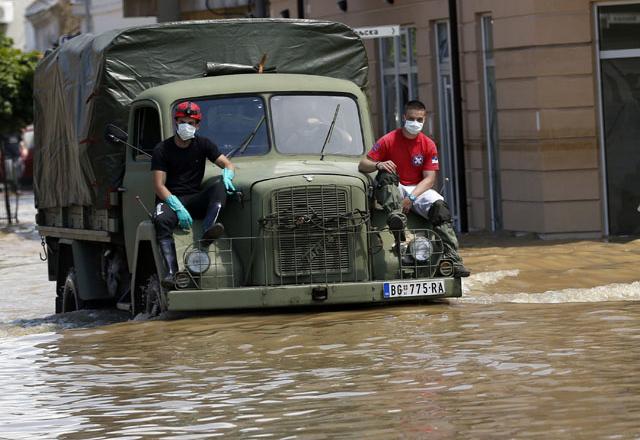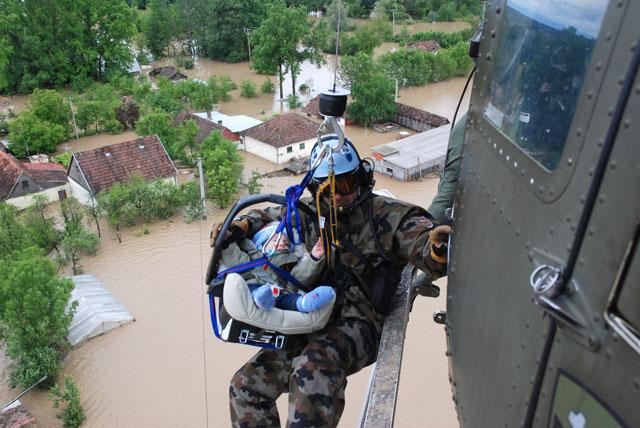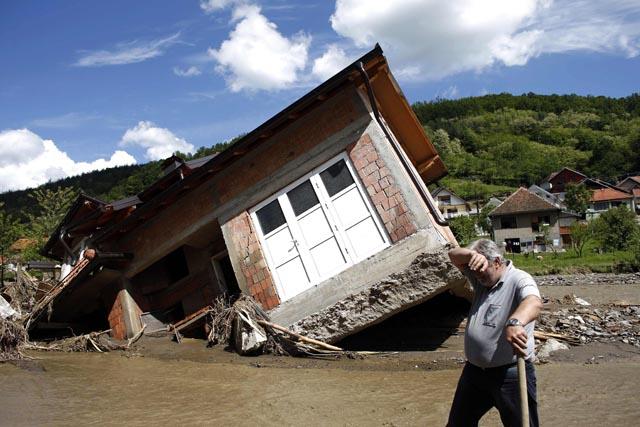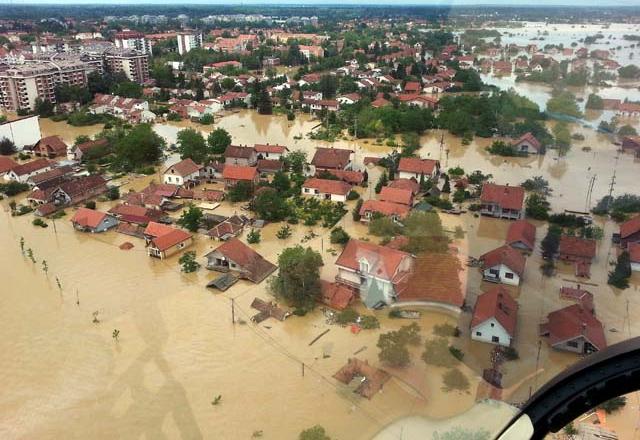You are here
Health officials warn of epidemic as Balkans mourn dead
By AFP - May 20,2014 - Last updated at May 20,2014

BELGRADE — Serbia declared three days of national mourning Tuesday as the death toll from the worst floods to hit the Balkans in living memory rose to 49 and health officials warned of a possible epidemic.
More than 1.6 million people have been hit as the river Sava and its tributaries have burst their banks, inundating tens of thousands of hectares of farmland, and destroying homes and buildings.
At least 49 people have been killed already by the worst floods in central Europe for more than a century.
Weather officials warned that water levels of the mighty Danube, Europe’s second longest river after the Volga, could rise further Wednesday at its confluence with the Sava in the Serbian capital Belgrade.
Serbia, which has been the worst affected by the deluge, declared three days of mourning for its victims from Wednesday.
“We have been affected 10 times more than the other countries in the region, but I hope the toll would not show that,” Serbian Prime Minister Aleksandar Vucic said.
Authorities have begun assessing the damage caused by the floods, already expected to reach hundreds of millions of euros.
The European Bank for Reconstruction and Development said its president, Suma Chakrabarti, would advise the new Serbian government — sworn in late last month — on its response to the flooding during a three-day visit from Wednesday.
Sarajevo on Tuesday also declared a day of mourning for Bosnia’s 25 dead as thousands of volunteers struggled to reinforce dikes along the Sava river.
More than 100,000 people have already been evacuated in Bosnia in the worst exodus since its 1992-95 war.
Threat of epidemics
The World Health Organisation said Tuesday that it has sent an expert to advise Serbian authorities on sanitation and ensuring safe drinking water for people as they return home after the floods.
The UN health agency said it is also working to mobilise medical supplies, including supplies to fight diseases commonly spread by floods.
In Bosnia, health authorities have begun disinfecting flooded areas in a bid to prevent outbreaks turning into an epidemic as temperatures rise.
Foreign Minister Zlatko Lagumdzija said more than a quarter of the country’s population of 3.8 million has been affected by the floods after the heaviest rainfalls on record began last week.
“We will face a major fight against epidemics and infectious diseases which are inevitable after such floods,” said Nermin Niksic, the prime minister of the Muslim Croat Federation, one of the two entities that make up post-war Bosnia.
Local health officials warned of the possible outbreak of “infectious diseases”, calling on the population from affected areas to use only bottled water.
Tonnes of dead animal carcasses have already been taken from farms for destruction, but muddy areas and landslides have hampered their collection.
“In some areas there were cases of enterocolitis which could be a signal of epidemics,” said Sevledina Sarajlic-Spahic, the top health officer in Zenica, one of the worst affected towns in Bosnia.
Belgrade braces
Serbia, where more than 30,000 people have been evacuated from the areas affected by floods, braced for more rising waters.
Hydrologist Sinisa Mihajlovic predicted the Danube would swell further in the coming days but that it should “remain within the flood-defence limit”.
Belgrade mayor Sinisa Mali said the capital was “ready” in case water levels rise further on the Sava and Danube.
“We are following the situation closely, and we are ready to intervene if needed,” Mali told reporters.
In Belgrade, volunteers have placed some 12 kilometres of sandbags to prevent flooding.
“I didn’t hesitate at all,” said Milenko Pajic, an 18-year-old student. “If my grandfather could fight for his country with arms, I can pack up and hand over sandbags.”
Meanwhile in Obrenovac, one of the worst-hit towns in Serbia, rescuers have managed to contain the waters around the Nikola Tesla power plant which produces half the country’s electricity.
Vucic told a government meeting that so far 14 deaths were registered in Obrenovac alone after another two victims were found, with autopsy results showing half of them drowned.
The disaster claimed another eight lives elsewhere in Serbia and two in neighbouring Croatia.
Landslides claimed at least one other victim in Bosnia.
Dozens of towns and villages have been cut off and more than 2,000 landslides have been reported in the region.
And in another potentially deadly side-effect, officials in Bosnia warned Monday that some 120,000 unexploded mines left over from the Balkan wars of the 1990s could be dislodged and moved.
Related Articles
A landmine dislodged by devastating floods in the Balkans exploded in Bosnia, officials said Wednesday, hurting no one but highlighting the dangers of a huge clean-up operation as governments began counting the costs.
Bosnia said Monday it was witnessing “the biggest exodus” since the 1990s war after the worst floods in a century inundated huge swathes of the Balkans, killing at least 47 people.
Soldiers, police and villagers battled to protect power plants in Serbia from rising flood waters on Sunday as the death toll from the Balkan region’s worst rainfall in more than a century reached 37.


















